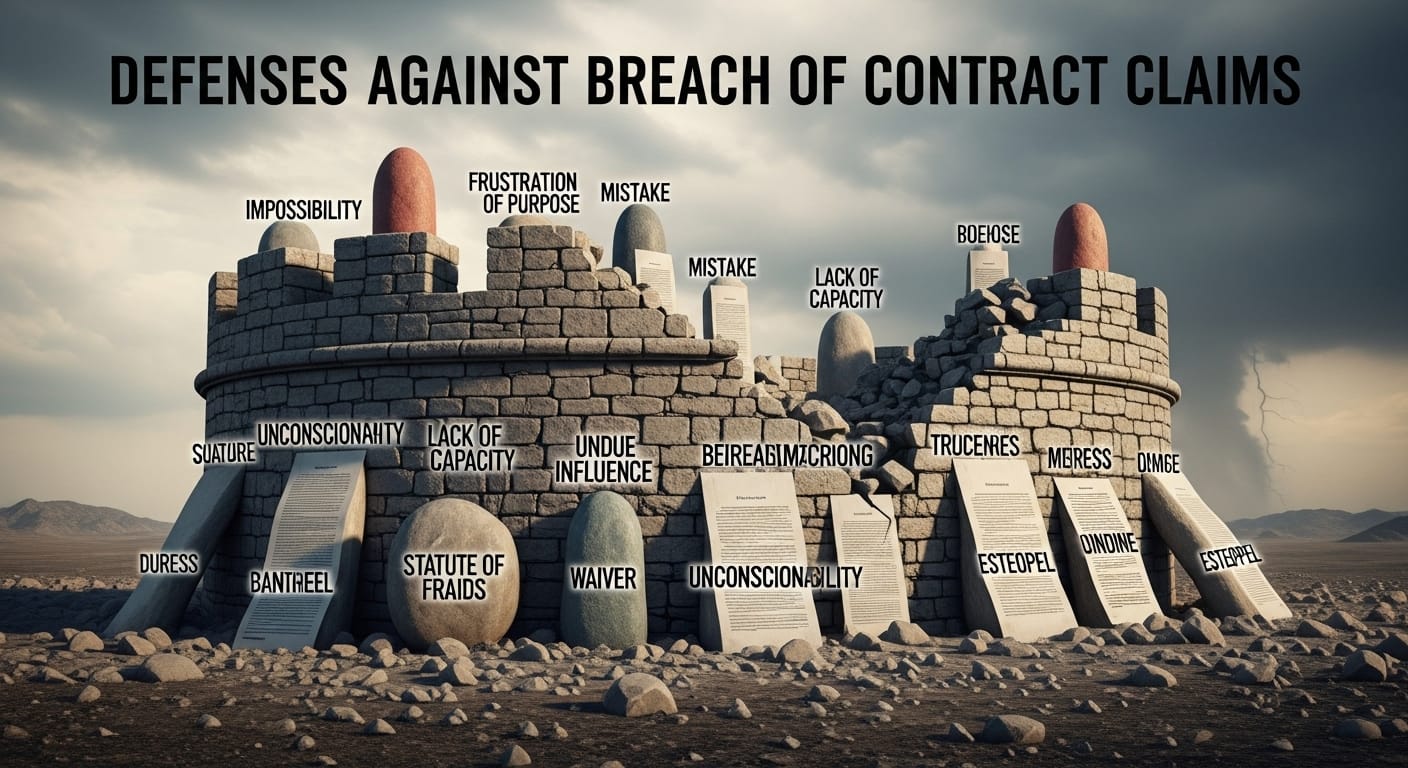Getting accused of breaching a contract is no picnic. It’s stressful, confusing, and can make you feel like you’re suddenly stuck in an episode of Law & Order: Contract Disputes Unit.
The good news? Just because someone claims you broke the deal doesn’t mean you’re automatically guilty. Contracts, while legally binding, have plenty of room for defense. Whether it’s proving the contract wasn’t valid in the first place or arguing that circumstances beyond your control got in the way, there are ways to fight back.
Let’s take a look at some of the most common defenses against breach of contract claims and how they might just save your hide.

Top Takeaways and Key Concepts
Challenge Contract Validity: Verify all essential elements—offer, acceptance, consideration, and mutual intent—exist.
Use Impossibility Defense: Prove unforeseen events made fulfilling the contract literally impossible.
Identify Fraud or Misrepresentation: Show the other party intentionally lied or withheld critical information.
Claim Duress or Undue Influence: Demonstrate you were pressured or manipulated into signing the contract.
Check Statute of Limitations and Waivers: Confirm deadlines haven’t expired and see if the breach was knowingly accepted.
Summary of This Article
Please Note: This post may contain affiliate links. If you click one of them, we may receive a commission at no extra cost to you. As an Amazon Associate, I earn from qualifying purchases.
The article explains common defenses against breach of contract claims. Key strategies include questioning contract validity, arguing impossibility of performance, proving fraud or misrepresentation, demonstrating duress or undue influence, and leveraging statutes of limitations or waivers. By understanding these defenses and gathering supporting evidence, individuals can protect themselves from unfair accusations and navigate contract disputes more effectively, potentially avoiding costly or unnecessary litigation.
The Contract Wasn’t Valid

Before diving into whether you breached the contract, the first question to ask is: Was the contract even valid?
A contract isn’t enforceable unless it meets certain requirements, like an offer, acceptance, consideration (legal speak for “something of value”), and mutual intent to enter a binding agreement. If any of these are missing, the contract could be null and void.
For example, if you and your neighbor agreed on a deal while enjoying a few margaritas and neither of you remembered what you agreed to by the next day, that’s not exactly enforceable. On the other hand, if you signed a detailed, written agreement that a lawyer would applaud, it’s going to be much harder to argue that the contract wasn’t valid.
Impossibility Of Performance
Sometimes, life throws a curveball that makes fulfilling a contract literally impossible. In legal terms, this is known as impossibility of performance. For example, if you were hired to cater an event and the venue was suddenly destroyed by a hurricane, there’s not much you can do about that.
The key to this defense is proving that the situation truly was impossible—not just inconvenient. Courts are not known for their sympathy when someone claims, “It was raining, so I didn’t feel like delivering the goods.” To win on this defense, the event has to be unforeseeable and out of your control.
Fraud Or Misrepresentation
If the other party lied or withheld important information when you entered into the contract, you could have a defense based on fraud or misrepresentation. Imagine agreeing to buy a car after being told it’s brand new, only to find out later it’s a 20-year-old rust bucket with a past life as a rental. That’s fraud, and it could void the agreement altogether.
For this defense to work, you have to prove that the misrepresentation was material—meaning it directly influenced your decision to enter the contract. A tiny white lie probably won’t cut it, but major deception is fair game.
Duress Or Undue Influence
Contracts should be signed willingly, without anyone being bullied or manipulated into agreeing. If you can prove you were forced into the contract under duress or undue influence, you might have a solid defense.
Duress usually involves a threat—like someone saying, “Sign this, or you’ll regret it.” Undue influence is more subtle, involving pressure from someone in a position of power, like a boss or a trusted advisor, who convinces you to agree to something that unfairly benefits them. Courts take these situations seriously, so don’t hesitate to raise this defense if it applies.
Mistake
Mistakes happen, but not all of them are enough to void a contract. For this defense to work, the mistake has to be mutual—meaning both parties misunderstood an essential term of the agreement. For example, if you and a buyer both thought you were selling a famous piece of art, only to find out it was a replica, that’s a mutual mistake.
Unilateral mistakes—when only one party is confused—are harder to argue. Courts usually expect everyone to read the fine print before signing, so “I didn’t know what I was agreeing to” isn’t a great excuse.
Failure Of Consideration
Consideration is what makes a contract legally binding. It’s the “something of value” that each party gives up in exchange for the agreement. If one party doesn’t provide their promised consideration, the other party might be off the hook.
For example, if someone agreed to pay you for your landscaping services but then never actually handed over the cash, you’re not obligated to keep mowing their lawn. No consideration, no contract.
Illegality
If the contract involves something illegal, it’s not enforceable—period. You can’t sue someone for failing to uphold an agreement to smuggle rare parrots across the border or run an underground casino in your basement.
Sometimes, contracts become illegal after they’re signed due to changes in the law. If that happens, you might have a defense that voids the contract entirely.
The Statute of Limitations Expired
Every state has a statute of limitations for breach of contract claims, which is essentially a deadline for filing a lawsuit. If the other party waits too long to bring a claim, their case might be dismissed, no matter how valid it is.
Keep in mind that the clock usually starts ticking on the date of the breach—not when the other party realized it happened. So, if they’ve been procrastinating for years, you could argue that they’ve missed their chance.
Waiver
If the other party knowingly accepted your breach or overlooked it, they might have waived their right to enforce the contract. This defense is all about their actions—or lack thereof.
For instance, if you paid your rent late for six months in a row and your landlord never complained, they can’t suddenly demand that you pay on time. Their silence or acceptance can work in your favor, so be on the lookout for any signs that they let the breach slide.
Conclusion
Facing a breach of contract claim can be nerve-wracking, but it doesn’t have to be the end of the world. By understanding the common defenses, gathering your evidence, and maybe even hiring a good attorney, you can protect yourself and fight back against unfair accusations.
Contracts might be serious business, but they’re far from unbreakable—especially when you know how to navigate the legal system.
Suggested Resources:
Defenses Against Breach of Contract Claims
https://www.nolo.com/breach-defenses
How to Prove a Contract Was Not Valid
https://www.lawdepot.com/contract-validity
Understanding Impossibility of Performance
https://www.legalresources.com/impossibility-contracts
Frequently Asked Questions
What makes a contract legally valid?
A valid contract must include an offer, acceptance, consideration, and mutual intent to form a binding agreement. Missing any of these elements can invalidate the contract.
What is the impossibility of performance defense?
This defense applies when unforeseen events, such as natural disasters, make fulfilling the contract truly impossible rather than simply inconvenient or costly.
How does fraud or misrepresentation affect a contract?
If one party intentionally lies or withholds key information that influences the agreement, the contract can be voided based on fraud or material misrepresentation.
What does duress or undue influence mean in contract law?
Duress involves threats or coercion forcing someone to sign, while undue influence refers to manipulation by someone in a position of power, both making the contract unenforceable.
Can a mutual mistake cancel a contract?
Yes. If both parties misunderstood a key term of the agreement, the contract may be voided. However, one-sided mistakes are harder to use as a defense.
What is failure of consideration in a contract dispute?
Failure of consideration occurs when one party doesn’t deliver what was promised. Without an exchange of value, the contract may not be legally enforceable.
How does the statute of limitations impact breach of contract claims?
If the claimant files the lawsuit after the legal deadline set by state law, the case may be dismissed regardless of its validity.

Kevin Collier is a legal expert passionate about simplifying complex legal concepts for everyday individuals. With a focus on providing clear, practical information, he covers a wide range of topics, including rights, responsibilities, and legal procedures. Kevin aims to empower readers with the knowledge they need to navigate the legal landscape confidently, ensuring they can make informed decisions regarding their legal matters. Through insightful articles and easy-to-understand resources, he helps demystify the law, making it accessible to all.










